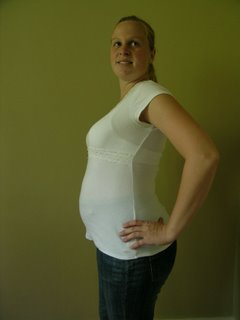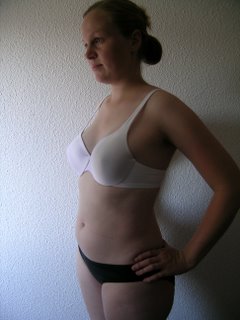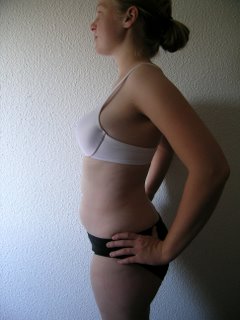One question that I often hear when people learn I am giving birth at home is "but are you seeing a doctor or a midwife for your pregnancy?" The short answer is no. This post is the longer answer about what prenatal care means when you're not seeing a professional.
First, true prenatal care is NOT going to a doctor once a month to be weighed, measured, and examined. Prenatal care is how well you take care of yourself in between those visits. This includes eating an excellent diet, exercising, getting enough sleep, eliminating stress, and taking the initiative to remain healthy.
So, what do I do to take care of myself?
1. I try to eat a whole foods diet, focusing on adequate protein, calories, whole grains, fruits and vegetables, fluids, and salt. We rarely eat processed foods or sweets (except very dark chocolate, which is actually good for you! My favorite is 86% cocoa, although 70% is quite good as well).
2. I exercise regularly. I walk at least 2-3 miles per day, thanks to my lovely Dalmatian Zeke. We go down to the bike path every morning for a brisk 2 mile walk. He runs off leash, chases ducks and deer, and splashes in the creek. I usually go on a shorter walk or two with him in the afternoon or evening. I also swim 3/4 mile (24 laps) three times a week.
3. I take good quality prenatal vitamins and some supplements. I don't feel this is truly necessary, but it's a good idea unless you can eat all organic, free-range foods. I use Rainbow Light's Complete Prenatal System. They're big, green, and smell like grass. Mmmmm. I also take fish oil capsules because we don't have access to good seafood here in the Midwest. (Read Michel Odent's fascinating article on the
role of fatty acids from seafood.) I took vitamin B6 supplements during my first trimester. I didn't really get sick at all--just a few weeks of feeling blah and "off." Was it the B6? Who knows...
4. I keep track of my uterus' growth by measuring fundal height. I note how my fundus is growing in respect to certain landmarks--3 fingers above the belly button, etc. I also get out my handy dressmaker's measuring tape and measure in centimeters from the pubic bone to the top of the fundus.
5. I listen to the baby's heartbeat and placenta with a fetoscope. I bought the cheapest model I could find for $13 and was able to locate the heartbeat around 16 weeks. I usually count the heartrate when I listen. So far it's been consistently in the 150s. It's fun to locate the placenta; it makes a swooshing/rushing noise in synch with my own heartbeat. Last I checked, mine was on my left side about waist high.
6. I weigh myself occasionally. So far I have gained about 18 lbs (as of 28 weeks gestation). Most of the weight gain occurred while I was in France over the summer.
7. I pay attention to the baby's movements and enjoy the acrobatics. As the pregnancy advances, I've noticed more distinct kinds of movements: kicks, punches, rolls, stretches. This baby likes to move its hands on my lower left side, and kick on my upper right.
8. I checked my hemoglobin level 2 weeks ago. It had fallen from 13.6 pre-pregnancy to 12.9. A stable or rising Hg level is the earliest indication of an inadequate blood volume expansion (due usually to inadequate nutrition), which if unresolved can lead to metabolic toxemia. I was reassured that my blood volume had expanded, although I am still vigilant about my nutrition.
9. I sleep as much as my body needs. I can usually get enough at night, despite waking up several times to go the bathroom, but I take naps if I feel the need.
10. I check my blood pressure occasionally, perhaps twice so far. I haven't checked it since I went to France, so I might again out of curiosity. Blood pressure can fluctuate tremendously depending on a woman's environment and stress level, so it's not something I am terribly concerned about monitoring.
11. I read, read, read. I love my textbooks by Anne Frye (
Holistic Midwifery vols 1-2 and
Understanding Diagnostic Tests). I talk to my midwife friends if I have questions. I search the internet. Most of all, I enjoy my pregnancy and the sense of discovery that comes when you take care of yourself, rather than waiting for someone else to tell you if you're healthy or not.
12. I keep track of these things, and more, on these nifty "Moon Charts" that I made. They're loosely based on fertility charts from the book
Taking Charge of Your Fertility, but with lots of extra columns added for pregnancy stuff. I just started my 8th moon chart (they are 4 weeks each).



